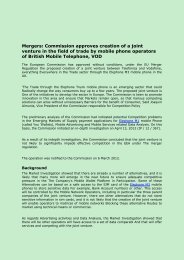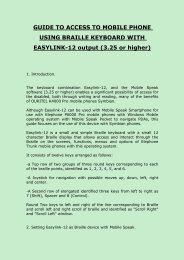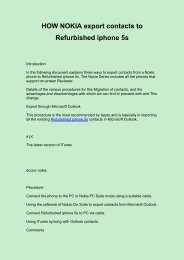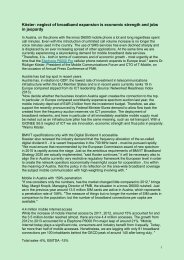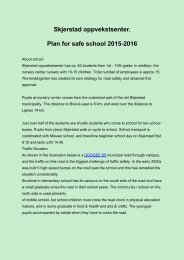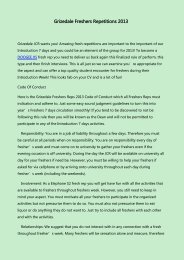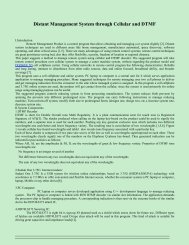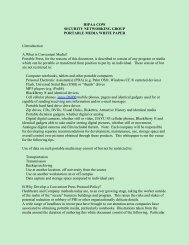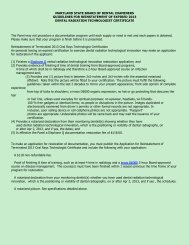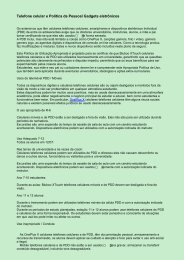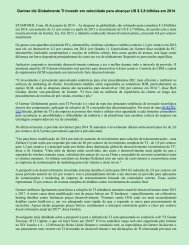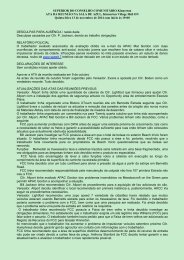WASHINGTON AND LEE UNIVERSITY.pdf
WASHINGTON AND LEE UNIVERSITY
WASHINGTON AND LEE UNIVERSITY
You also want an ePaper? Increase the reach of your titles
YUMPU automatically turns print PDFs into web optimized ePapers that Google loves.
<strong>WASHINGTON</strong> <strong>AND</strong> <strong>LEE</strong> <strong>UNIVERSITY</strong><br />
Workers and staff who plan to: 1) journey abroad; 2) actually trade or “share” (broadly described, such as email<br />
communication) technology or technology-based analysis with a non-U.S. resident, whether on U.S. or<br />
worldwide soil; or 3) enter into any agreement (including a grant) with individuals outside the U.S. in an area<br />
relevant to technology or technical innovation, should bear in mind that these actions may implicate (and in<br />
some situations may be limited by) U.S. trade management laws and rules. These laws and rules mainly<br />
concentrate on the discussing or trade of technical innovation that could have army, atomic, or aerospace<br />
programs, but in some conditions can implement to such seeming simple products as notebooks, OUKITEL U8<br />
mobile phones, PDAs, and GPS gadgets, even when they are being used on pleasure visits.<br />
Export management rules would most likely impact you under one of two scenarios: 1) going to any worldwide<br />
nation (but particularly one that is on a govt watch list) with a laptop or other system that contains certain<br />
complicated, but progressively typical technical innovation, such as security or GPS technology; 2) mailing or<br />
verifying with a worldwide pupil under a allow or otherwise about details that may have army, atomic, or<br />
aerospace application, or actually taking such details or technical innovation into overseas.<br />
Export management laws and rules have persisted for many years, but there has been a important recent pattern<br />
towards administration in the college perspective. Offenses of these laws and rules can result in serious charges<br />
for both the person violator and the School, including: municipal and legal charges of up to one thousand<br />
money per violation; up to ten years in prison; and/or lack of all govt financing.<br />
The vast majority of educating, analysis, and journey performed by W&L faculty and staff will come within<br />
one or more of the various exclusions to the trade management laws and rules. The university has developed<br />
Export Control Recommendations [http://www.pandawill.com/ulefone-be-touch-smartphone-touch-id-3gb-<br />
16gb-mtk6752-octa-core-64bit-4g-55-inch-white-p101507.html], a Q&A site<br />
[http://www.pandawill.com/oukitel-u8-4g-smartphone-55-inch-mtk6735-quad-core-android-51-2gb-16gbwhite-p102066.html]<br />
and links to other resources [http://www.pandawill.com] which offer a conclusion of<br />
these exclusions. The Recommendations also contain a information of the positions performed by various<br />
individuals during the school grant/research procedure. Note that each individual faculty and employee has<br />
main liability to consider and achieve conformity with trade management laws and rules before interesting in<br />
any action that may be trade managed. If an exemption does not implement, the Workplace of Common Advice<br />
will assist you in obtaining an trade certificate, but bear in mind that this procedure usually takes three to six<br />
several weeks.<br />
We send this memo along to give you a heads-up about these laws and rules and to motivate you to seek advice<br />
from the Recommendations while planning a trip overseas or before performing analysis or working together<br />
with a non-US resident on technology or technical innovation of the kind mentioned above.<br />
Questions regarding the usefulness of trade management laws and rules should be instructed to the Workplace<br />
of Common Advice.<br />
<strong>WASHINGTON</strong> <strong>AND</strong> <strong>LEE</strong> <strong>UNIVERSITY</strong> EXPORT CONTROL GUIDELINES<br />
Background<br />
Federal laws and rules limit the trade of certain products, details, and technical innovation in ways that impact<br />
California and Lee School. These laws and rules mainly concentrate on technical innovation that could have<br />
army, atomic, or aerospace programs, but in some conditions, can implement to such seeming simple products<br />
as notebooks and ulefone Be Touch 2 mobile phones. U.S. trade management laws and rules have persisted for<br />
decades; their usefulness to college has been of particular interest for at least the past 25 years or so. Although<br />
the events of Sept 11, 2001 led to a important increase in administration of trade management laws and rules, a<br />
pattern toward greater administration had already been ongoing. As part of this administration pattern, the<br />
various govt departments with liability for implementing trade management rules have progressively turned<br />
their attention to conformity in the college setting. Although the focus has mostly been instructed toward<br />
educational analysis organizations, all college organizations, such as small generous arts educational<br />
institutions such as California and Lee School, are affected by and must adhere to these trade management laws<br />
and rules.
Federal Penalties<br />
Export management laws and rules are serious matters that carry serious charges for both the person violator<br />
and the School, including:<br />
1. Civil charges of up to five-hundred thousand money ($500,000) per violation; seizure/forfeiture of the<br />
products, technical innovation or analysis product; and/or lack of trade rights.<br />
2. Criminal charges of up to one thousand money ($1,000,000) per violation; and/or up to ten (10) years in<br />
jail.<br />
3. Risk of losing govt financing.<br />
Guidelines<br />
Washington and Lee School plans to fully adhere to trade management laws and rules as they implement to the<br />
University’s actions. Under no conditions shall teachers, employees, or other individuals performing on part of<br />
the university take part in actions in contravention of U.S. trade management rules. Primary liability for<br />
conformity with trade management laws and rules can be found with each individual faculty or employee.<br />
Concerns regarding the usefulness of trade management laws and rules should be instructed to the Workplace<br />
of Common Advice.<br />
The vast majority of educating, analysis, and journey performed by W&L faculty and employees will come<br />
within one or more of the various exclusions to the trade management laws and rules. However, the rules have<br />
the prospective to limit certain analysis opportunities, impact book rights, and prevent worldwide cooperation<br />
in certain analysis areas. Export manages are most likely to impact W&L faculty and staff in the following<br />
possibly the actual situations:<br />
1. Traveling abroad;<br />
2. “Sharing” (broadly described and contains emails) technology or technology-based analysis with a non-<br />
US resident, whether on U.S. or worldwide soil; or<br />
3. Entering into a agreement (including a grant) relevant to technology or technical innovation.<br />
Compliance with trade manages must be considered and obtained before journeying, interesting in technology<br />
or technology-based analysis, or interesting in any other action that may be trade managed. In most situations,<br />
this will simply include verifying that the travel/research drops within an exemption to the trade management<br />
laws and rules. In the few situations where the action does not drop within an exemption, an trade certificate<br />
will need to be obtained from the relevant government agency. This procedure can take up to six (6) several<br />
weeks – therefore it is wise to plan in advance.<br />
Travel to Certain Countries<br />
If you are journeying overseas, the first thing to know is whether you are going to a nation that has been<br />
accepted by the U.S. Workplace of Foreign Resource Control (see record here:<br />
http://www.pandawill.com/ulefone-be-touch-smartphone-touch-id-3gb-16gb-mtk6752-octa-core-64bit-4g-55-<br />
inch-white-p101507.html). Go to these nations is intensely controlled, and in some conditions banned. Anyone<br />
seeking to journey to one of these nations on University-related business or analysis should seek advice from<br />
with the Workplace of Common Advice.<br />
Travel With Laptop computer systems, GPS, Cell Phones, and Other Common Items<br />
Generally discussing, and provided that you are not going to an OFAC-sanctioned nation, you may likely take<br />
laptops, GPS gadgets, OUKITEL U8 mobile phones, and other typical, individual use technical products as<br />
long as:<br />
• The system, such as any application installed on it, does not contain security technical innovation (be<br />
conscious that security is becoming more and more typical on certain gadgets and application programs);<br />
• You own the product or are using a W&L-owned device;<br />
• You will return to the U.S. with the product within one year;<br />
• The system is for individual use or is a kind of system that is regular and reasonably used within your<br />
profession;<br />
• You will maintain management over the item at all times (e.g. by keeping in your ownership or securing in a<br />
resort safe)
• The system, its application, and actual technical innovation will not be put to army use, used in space, or used<br />
to develop weaponry of mass devastation.<br />
If any of the above conditions do not implement to you, or if you have any queries, contact the Workplace of<br />
Common Advice for an individual evaluation of your journey situation.<br />
Research<br />
Most analysis performed at W&L will drop within an exemption to the trade management laws and rules.<br />
Generally, if the causing analysis is released and usually accessible to the public (or distributed usually within<br />
the medical community), the analysis is likely exempt from trade management laws and rules. However, bear<br />
in mind that these exclusions are lost if you accept certain contract conditions concerning:<br />
• Foreign nationals;<br />
• Publication limitations or pre-publication review; or<br />
• Access or submission manages.<br />
Thus, it is crucial that you properly evaluation any agreement – along with a allow – you might indication in<br />
connection with your analysis. If you see conditions dealing with any of the above problems, you are advised to<br />
contact the Workplace of Common Advice.<br />
In the perspective of analysis, the positions of each individual/office listed below are as follows:<br />
1. Faculty Member<br />
a. Identify prospective usefulness of trade management laws and rules to the research/project; if it is<br />
determined that trade management laws and rules might be applicable:<br />
i. Contact the Workplace of Common Counsel;<br />
ii. Understand that obtaining any necessary certificate from the govt may take up to six (6) months;<br />
iii. Identify the titles, nation of source, and nation of citizenship of anyone who will be involved in the<br />
research/project;<br />
iv. See that accessibility and submission of technological innovation and details relevant to the venture are<br />
limited to those individuals and locations that are not trade controlled; and<br />
v. Report any alleged violations of trade management laws and rules to the division seat, the Provost, and<br />
the Workplace of Common Advice.<br />
2. Department Chair and Dean<br />
a. Read any agreement – along with a allow – properly with an eye for sources to:<br />
i. Export management laws;<br />
ii. Foreign nationals;<br />
iii. Publication limitations or pre-publication review; or<br />
iv. Access or submission manages.<br />
b. Inform the PI that s/he must contact the Workplace of Common Counsel; and<br />
c. Do not indication any agreement until any appropriate trade management problems have been resolved by<br />
the Workplace of Common Advice, and, if necessary, accepted by the Provost.<br />
3. “Empowered Official” – Provost<br />
a. See that School faculty and staff are conscious of and adhere to trade management laws;<br />
b. Make the greatest dedication as to whether to give up a contract/grant that, despite efforts at discussion,<br />
contains conditions that lead to further problems for the School under trade management laws;<br />
c. Make the greatest dedication as to whether to implement for a certificate or give up the venture due to the<br />
pressure of trade controls;<br />
d. Investigate revealed violations of trade management laws; and<br />
e. Report violations of trade management laws and rules to appropriate govt organizations.<br />
4. Corporate and Base Relations<br />
a. Remind faculty – specifically those whose analysis includes technology or technical innovation – of the<br />
prospective usefulness of trade management laws and rules and motivate them to publish any allow programs,<br />
etc. with enough lead time for any necessary agreement discussions and/or certificate acquisition;<br />
b. Review each contract/grant for prospective usefulness of trade management laws; and<br />
c. Contact the Workplace of Common Advice if it appears that trade management laws and rules might<br />
implement.<br />
5. Office of Common Counsel
a. Provide legal presentation of trade management laws and rules as they impact School activities;<br />
b. Negotiate with analysis vendors or other third parties when contracts/grants include conditions that are<br />
challenging under trade management laws;<br />
c. Apply for appropriate permits as asked for by the Provost; and<br />
d. Engage outside counsel with skills in trade management laws and rules as needed.



